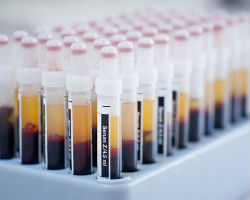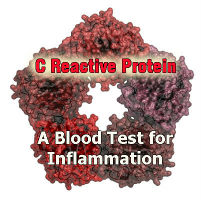The C-Reactive Protein
 Blood tests are a great way to learn many things about the patient’s state of health and make a correct diagnosis and as early as possible. Fortunately, there are some tests for heart disease. They show whether the individual is at risk for cardiovascular disease, and exactly how high that risk is. The most common is the cholesterol test. This type of testing measures the amount of LDL, the blood cholesterol, in the blood. A high level of LDL means that there is a higher chance of atherosclerosis, which is the same as saying that there is a high risk of heart problems. Although all people with a high level of LDL are in danger of having a heart attack, not all people who experience heart attacks have a high level of LDL. This means that cholesterol testing only red-flags half of the cases where people are in danger.
Blood tests are a great way to learn many things about the patient’s state of health and make a correct diagnosis and as early as possible. Fortunately, there are some tests for heart disease. They show whether the individual is at risk for cardiovascular disease, and exactly how high that risk is. The most common is the cholesterol test. This type of testing measures the amount of LDL, the blood cholesterol, in the blood. A high level of LDL means that there is a higher chance of atherosclerosis, which is the same as saying that there is a high risk of heart problems. Although all people with a high level of LDL are in danger of having a heart attack, not all people who experience heart attacks have a high level of LDL. This means that cholesterol testing only red-flags half of the cases where people are in danger.
What is the C-reactive protein?
The CRP was discovered over seventy years ago. It is a pattern recognition molecule, derived from the liver, which increases in periods of inflammation. Thus, it is a fantastic marker for inflammation. Inflammation can be caused by bad cholesterol particles. The LDL does not only stick to artery walls but it can also injure them. Such an injury creates an inflammation. Each inflammation is followed by a quick increase of the CRP protein. This protein is an important part of the immune system's defense mechanism.
CRP testing and its effectiveness
 Several studies have shown that the level of CRP in the blood is directly proportional to the level of risk of heart disease. The higher the level of CRP, the higher the risk. In fact, a clinical trial involving 18 000 healthy people, was carried out to determine the exact relationship. It showed that an elevated level of CRP is an indication that the person is three times more likely to suffer from heart disease than someone with a normal level of CRP. This type of testing has been proven to be just as successful as cholesterol testing.
Several studies have shown that the level of CRP in the blood is directly proportional to the level of risk of heart disease. The higher the level of CRP, the higher the risk. In fact, a clinical trial involving 18 000 healthy people, was carried out to determine the exact relationship. It showed that an elevated level of CRP is an indication that the person is three times more likely to suffer from heart disease than someone with a normal level of CRP. This type of testing has been proven to be just as successful as cholesterol testing.
The amount of the C-reactive protein in the blood can be determined by a blood test. The best thing to do is to have two blood tests done: one for cholesterol and one for the CRP. This way, there is an excellent chance of getting a correct diagnosis and preventing heart disease. Moreover, both of the tests are cheap, easy, and don’t require much blood.
The high-sensitivity C-reactive protein test is one of the tests that can be done.
- Less than 1mg of CRP per liter of blood means the possibility of heart disease is low.
- 1-2.9mg per liter means the possibility is medium,
- more than 3mg of CRP per liter indicates a high possibility of heart disease.
A high level of CRP can also indicate a high risk of type 2 Diabetes. It is important to understand that the level of CRP can be elevated for other reasons besides heart disease. Infections, arthritis, or other illnesses can spike the CRP level. It is important to tell your doctor about any such conditions before taking the CRP test.
Who should have the CRP test done?
The CRP test is not a routine test and should not be given to everybody. The American Heart Association advises all individuals with a moderate or high risk of heart disease to take the high-sensitivity C-reactive protein test. This test can help determine the amount of risk the patient is in. It is also effective in determining whether the treatments should be intensified. Here are a few risk factors that can indicate that the person is at risk for heart disease:
- Having a family history of heart disease;
- A previous stroke or heart attack;
- Elevated blood pressure;
- A high level of the bad cholesterol (LDL);
- A low level of the good cholesterol (HDL);
- Diabetes;
- Obesity;
- Decreased physical activity.
Individuals who have any of the risk factors mentioned above should consider having the CRP and cholesterol tests done to determine the level of risk they have. It is also advised that the C-reactive protein test be given to individuals preparing to undergo heart treatments such as angioplasty. It can help avoid several dangers.
What to do if the test shows an elevated level of CRP?
Test results that show an elevated level of CRP are not a death sentence. They are a warning sign. They show that a stroke or heart attack can occur if no changes are made and no steps are taken to decrease the CRP. Fortunately, there are several ways to decrease the amount of the C-reactive protein in the blood. One way is to turn to medications. Some statin drugs, such as Zocor, Lipitor, and others have the ability to lower the C-reactive protein level and the level of LDL in the blood. However, there are also other ways to decrease the amount of CRP and these involve lifestyle changes. Exercise is a fantastic and highly effective way to lower the CRP. Other forms of weight-loss, such as healthy and balanced dieting, are also effective. Thus, by getting regular exercise, eating a healthy diet, and refraining from smoking and other unhealthy habits, one can decrease the level of CRP in the blood and keep the heart and body healthy.
References:
1. http://www.ncbi.nlm.nih.gov/pubmed/16472048;
2. http://www.health.harvard.edu/newsweek/C-Reactive_Protein_test_to_screen_for_heart_disease.htm;
3. http://www.webmd.com/heart-disease/guide/heart-disease-c-reactive-protein-









